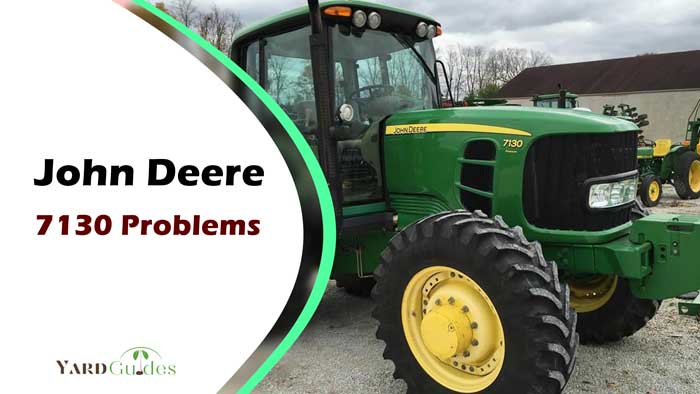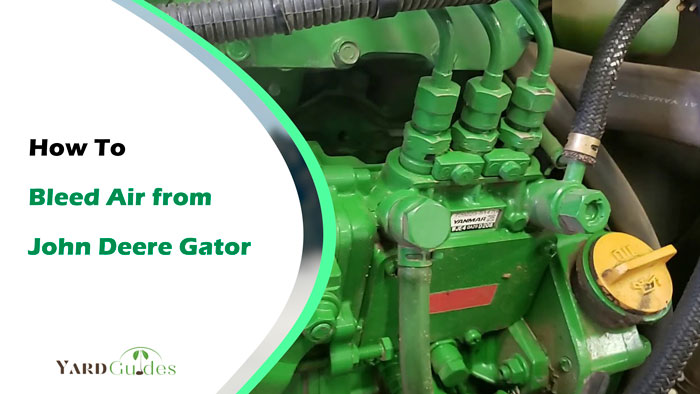Like any other machine, the John Deere 7130 tractor isn’t immune to problems. As an owner, you will face some common problems with your John Deere 7130. The fact is, you should be aware of them and troubleshoot them efficiently.
So, what are John Deere 7130 problems? You will come across engine problems like a short supply of power, a misfiring engine, and engine knocks that get progressively louder. Similarly, there are other problems such as diesel overheating, and inconsistent steering that are also shaky.
In this guide, we will discuss all common problems with their solutions. If you are an owner of a tractor, or going to purchase one for farming, read on to learn more about the issues with solutions.
Table: Problems And Solutions
Before we dig in deep, let’s look at a table of the problems and the fixes available for problems.
| Problems | Solutions |
| A short supply of power | Clean the muffler |
| Replace the fuel pressure relief valve if found faulty | |
| A misfiring engine | Tighten the hose clamp |
| Replace the fuel pipe if leaks are found | |
| Engine knocks that get progressively louder | Refill engine oil |
| Diesel overheating | Insufficient coolant |
| Engine oil might need refilling | |
| Inconsistent steering | Blow out all the air in the hydraulic system |
| Replace faulty steering cylinder |
John Deere 7130 Problems And How To Fix Them
We have come to the point where we will discuss the problem in-depth and cover the solutions that you can apply to fix them easily. So without any further ado, let’s get started.
1. A Short Supply Of Power
Your tractor is supposed to provide the same amount of power just like when you bought it. Well, engines do degrade over time. But if you notice a sudden change in the power, this is certainly a problem.
There are numerous reasons for this specific problem. An engine overload, a dirty muffler, and a faulty fuel pressure relief valve are to blame.
Solution
First, make sure you are not putting too much pressure on the engine. For example, going for a spin with your 7130 for 8 hours straight. Give it a rest.
Secondly, there might be debris on the muffler. Therefore, there is a possibility that it might be a blockage in the muffler. You will find the muffler in the rear bottom side of the 7130. Just take it out and clean it properly.
As mentioned before, it might also be a faulty fuel pressure relief valve. It is located on the fuel rail and close to the intake manifold. You need to confirm its well-being with a mechanic. It might be faulty and may need a replacement.
2. A Misfiring Engine
You know it’s an engine misfire when you feel that the engine is hesitating to power up, especially when you are accelerating harder. You will feel like the engine is not coping up at the speed that you expected.
Additionally, the engine will make weird sounds and vibrates. You will also notice high consumption of fuel and carbon emissions to increase.
Well, it is caused by undesired air entering the gasoline delivery line or the tank. As a result, the engine cannot process things smoothly. A significant decrease in engine performance is seen, and the engine starts to misfire.
Solution
- To resolve this issue, you will need to use hose clamps and pipes. Turn the screwdriver circularly to tighten the clamp and attach the hose to the gasoline delivery line.
- Likewise, the fuel pipe may also be damaged and thus leaking. It’s best if you replace the fuel pipe with a new one.
3. Engine Knocks That Get Progressively Louder
The third problem is the constant knocking on the engine. Well, as you accelerate harder, the sound keeps increasing, and at a point, it’s just unbearable.
The problem here is the lack of engine oil. When there isn’t sufficient engine oil, the engine rod bearing, and main bearing fails to function properly.
Thus, knocking is heard as there are no lubricants available to keep them running smoothly. Well, the solution is quite simple, though.
Solution
As mentioned, this type of knocking only leads to a deficiency of engine oil. The engine oil on your 7130 is about to finish, and you need to fill it up.
So, fill the engine oil as soon as you can. John Deere recommends that the SAE 5W-30 oil be used in their engines.
4. Diesel Overheating
It is a very bad sign if you come across diesel overheating. Yes, it’s a common problem, yet a serious one. As the diesel overheats, the engine heats up, too, which might damage the entire engine. Well, the primary reason for this problem is insufficient coolant.
It’s the coolant’s job to keep the engine stable by keeping it cool in there. Thus, any lack of coolant will lead to engines not getting sufficient temperature control.
You will find a temperature gauge in your John Deere dashboard. From there, you will see that it’s in the high-temp zone. This indicates the temperature of your engine’s coolant.
Solution
You need to fill it with more coolant in a reservoir attached to the radiator. Additionally, the engine might also need some oil. If it’s low on oil, then do fill it up.
Lastly, a clogged cooling fin is also to blame here. You need to take it out and clean it up. Here’s a demonstration of how you can do it;
5. Inconsistent Steering
Inconsistent steering here means that you are having a hard time moving the steering left or right. It can also get shaky sometimes. Well, the main problem here is the hydraulic system.
The air might have entered the system and interrupted the steering system. Well, you might be wondering how they are connected.
An engine-driven pump presses the hydraulic fluid, giving the steering system hydraulic pressure. As a result, you get smooth steering.
On the other side, the steering cylinder might be faulty. It is mounted between the front wheels under the engine oil pan.
Solution
- Step 1: You need to blow out all the air that is present in the hydraulic system.
- Step 2: To let the air out, open the top bleed valve.
- Step 3: Keep it open until the hydraulic fluid flows freely from the valve.
On the other hand, you can’t do much about a faulty steering cylinder. You must take it to a mechanic and replace it if you can’t do it yourself.
Conclusion
To sum up, the John Deere 7130 problems aren’t that hard to cure. As long as you keep your tractor’s internal system clean and rust-free, you are ahead of other tractor users.
On the other hand, it’s crucial that your tractor’s system doesn’t have any leaks so that no air gets inside. As you can see from the problems above, the air is not your tractor’s best friend. Lastly, don’t let your 7130 have any deficiency when it comes to engine oil.



